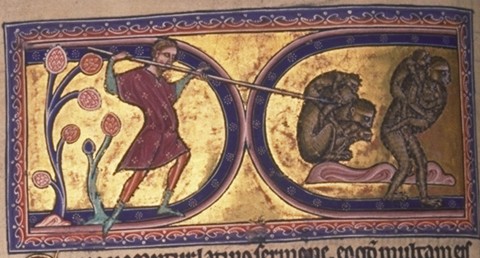
Microkhan has a longstanding fascination with non-human primates, and so was intrigued to stumble upon the homepage of Kenneth Gouwens, a history professor at UConn. One of Gouwen’s specialties seems tailor-made for us: “Distinctions drawn between humans and simians in the Renaissance and in our own era.”
Alas, Microkhan wasn’t able to locate any of Gouwens’ work on this particular subject. But in the process of poking around The Tubes, we did stumble upon an equally delectable prize: The Aberdeen Bestiary, a digitized version of a 13th-century English manuscript. The collection contains this priceless description of apes (illustrated above), as penned by a Medieval zoologist:
The female monkey gives birth to twins, loving one and hating the other. When hunted, she carries the loved one in her arms while the other clings to her back. Eventually she tires, drops the favoured baby and the other one is saved. The ape does not have a tail.
The whole bestiary is well worth your time, particularly the sections on the delicate interplay ‘twixt lions and tigers. Please note that Microkhan does not endorse the “glass trick” for stealing tiger cubs.


notlikely // Apr 24, 2009 at 2:37 pm
shameless plug for more marginalia: http://manuscripts.cmrs.ucla.edu/
Gramsci // Apr 24, 2009 at 3:04 pm
A treasure trove for religion scholars. I love all the theological resonance put on each animals, for example the androgynous hyena (who, like shellfish in the Hebrew Bible, are impure because they straddle “natural” categories) and the ascetic beaver, who saves himself through, um, a very painful procedure. Also love the ape twins as Jacob and Esau.
Brendan I. Koerner // Apr 24, 2009 at 7:09 pm
@notlikely: Aweome, thank you–a treasure trove. Expect some Microkhan posts to grow out of the UCLA collection at some point (despite the fact that, as a native Angeleno, I grew up pulling for USC).
@Gramsci: Totally missed the Jacob/Esau connection, but yeah, of course. In 13th-century England, religion was the only possible context.
Davis X. Machina // Apr 26, 2009 at 2:15 am
T.H. White, of Once and Future King fame, did a lovely paperback translation with black-and-white reproduction drawings, of the Bestiary, called The Book of Beasts. I believe the beast at the top of the link & blogroll column appears therein…
Brendan I. Koerner // Apr 26, 2009 at 11:14 am
@Davis: Awesome, thanks a mil for the tip. Huge fan of The Once and Future King back during my sword-and-sorcery phase.
Nataliaka // Mar 23, 2011 at 8:08 am
Yo creé los medieval monkeys